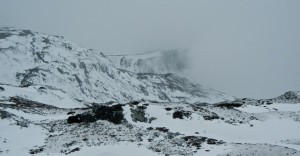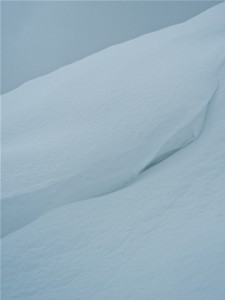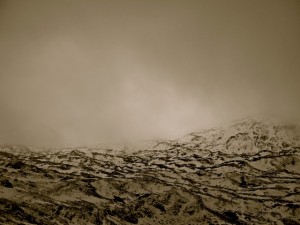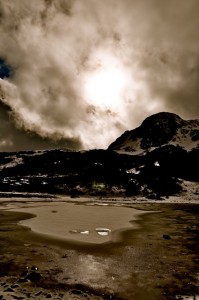Kilometres behind Shika landscapes become smudged white paintings – with a soundtrack of seething gusts. It is not only the increase in altitudes that seem to strengthen the storm. It is the journey leading further into the remote valleys. Temperatures drop and the mountains’ ever-present companion, the wind (loong in Tibetan) throbs and hums. At over 4,000 metres the precious temperatures drop without consideration.
This is the song of the mountain – a steady roar that comes up from the snow laden earth and down from the sky. It is now that it seems, the mountains are deciding how to proceed with me – whether I deserve a full show of the forces at hand.
There has always been that feeling that in these spaces up high the vicious shows of power are somehow laden with messages – that there might be something under the wind hinting at something divine. The rage of a mountain is like an angry breath that needs not to inhale. It effortlessly recreates geographic spaces and it is this that has long bound me to return. A landscape that once was, is no longer in an hour.
Landmarks disappear and darkness takes over the western sky. Old traders and muleteers along that great trade route, The Ancient Tea Horse Road have an adage that sums up ‘travel’ in the Himalayas: “know when to rise and know when to retreat if you wish to see another sunrise”.
That darkness I see spreading is a sign to me that a ‘retreat’ of sorts is necessary. Like all of history’s great opiates, mountains and storms urge one to continue, to ignore warnings and logic to pursue the course into…an abyss or heaven.
Sheets of wind billow into my back as I turn to make my gradual way down as light continues to falter. The moment that a barely visible sun starts to descend the currents of air dip and become more penetrating – as if the ‘hills’ are mocking this hasty retreat.
Skies see off the fading light with a steamy dark smoke, the alpine treeline reappears and sightlines gradually lengthen. Contentment and dissatisfaction battle it out at this stage of descents – that one has arrived ‘back, but that one didn’t range further.
Hours later in the dark, 1,500 metres down it is as if the winds never existed, though the ears burn with memory and the body still stoops in readiness and expectation of its driving force.
It is such with mountains though, that the skin and joints feel the touch long after one has left…the mind as well, never seems to forget that magnificent grip. Such are the mountains, that a return to them is inevitable.





Great post, Jeff, and great photos too!
You say “Like all of history’s great opiates, mountains and storms urge one to continue, to ignore warnings and logic to pursue the course into…an abyss or heaven.”
What is it, exactly, about mountains & storms that produces this effect on us?
Best wishes,
Peter
Hi Peter,
Often I think that in the mountains and with storms there are moments when some sort of higher power forces us to see differently, to hint at something tangible, beautiful, thrilling and entirely forceful. Like great bodies of water, mountains, I think, haunt and draw many of us with the temptation of something beyond that leads to something within….or in the simple unpretentious words of a good Sherpa friend “the mountains are there and we need to try and we are silly humans who need to try and scale them”.
Thanks for the clarification, Jeff. I liked the words of your Sherpa friend.
Best wishes,
Peter
Very fortunate the old “Salt Trader” can make the voyage with you ; what stories he may tell ?